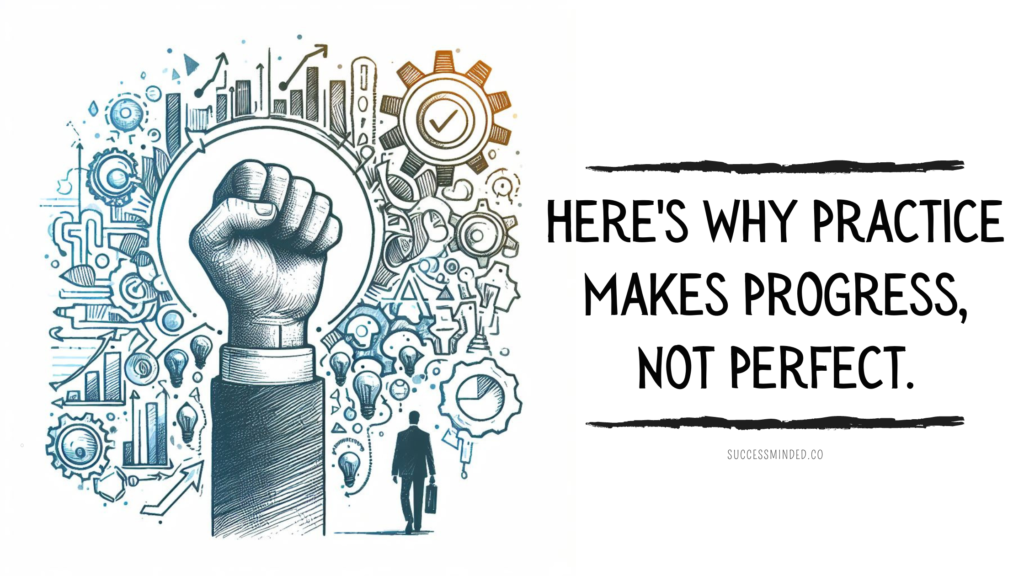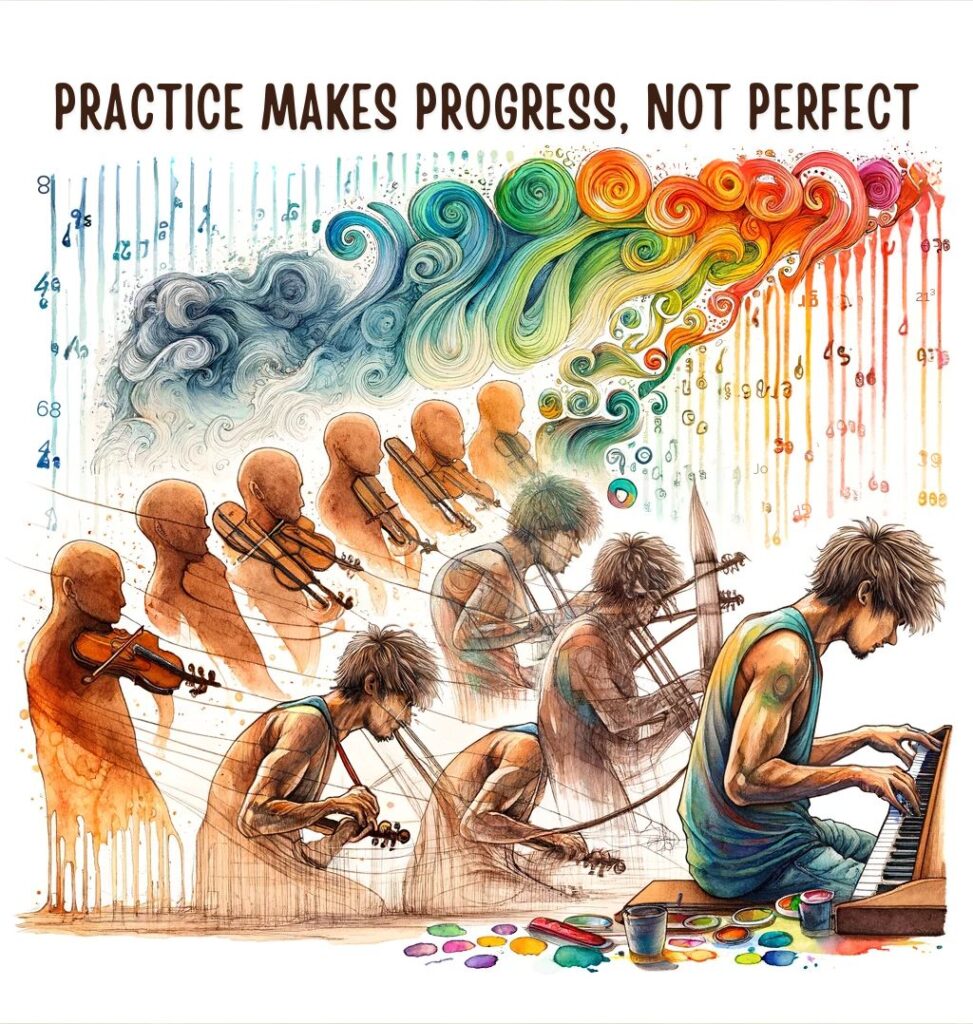“Practice makes perfect.” It’s one of those old adages we’ve heard from childhood that innocuously sticks with us and shapes our attitudes well into adulthood. When we set about learning a new skill, be it the guitar, speaking Spanish, or perfecting a sales pitch, this quote whispers in our mind that flawless proficiency in that skill is attainable through focused, diligent practice alone.
But what doesn’t ring true with this saying is the implication of an “endpoint” or finish line demarcating one as officially skilled, knowledgeable, or excellent within some domain of mastery.
The issue is, perfection is always a theoretical but elusive goal hovering out there tauntingly like a mirage. And tying our measurement of progress solely to this external yardstick of perfection inevitably leads to frustration and even a lack of motivation to persist practicing.
Instead, many psychologists and authors focusing on fostering sustainable, long-term growth now advocate for the reframed mantra: “Practice makes progress, not perfect.” This is about shifting mindsets to value the intrinsic gain made with each repetition rather than measuring ourselves against some mythical perfection standard.
Let’s explore why focusing on progress sets us up for more success than an illusory pursuit of perfection ever could.

The Illusion of Perfection
Seeking flawlessness or expecting perfect outcomes (whether our own performance or even from others) inevitably leads to disappointment simply because perfect doesn’t objectively exist – in humans, at least! Even the most talented, gifted prodigies across fields make mistakes, have limitations, and may deliver results that don’t fully meet whatever shifting criteria a perfectionist applies at the moment.
Moreover, chasing perfect mastery typically involves intense self-criticism, high anxiety, and immense pressure to meet unrealistic standards. This leads to burnout and even avoidance of practice out of fear of not being able to sustain continuous faultless performance.
Alternatively, beating oneself up repeatedly for not achieving perfection tends to erode self-confidence and intrinsic motivation.
Perfectionism simply isn’t compatible with the reality of being human with its built-in variability and opportunities for growth!
So, for sustainable progress, shifting the definition of “successful” practice to be about incremental gains ultimately sets us up for greater improvement.
Let’s look at this model applied to developing physical and behavioral skills:
Progress Over Perfection In Skills
Imagine a woman seeking to learn acoustic guitar. With a perfection mindset, unsatisfying practice sessions may lead her to tell herself, “If I’m not progressing fast enough to become the next Taylor Swift, then why bother?” Consequently, difficulty nailing tricky chord changes has her believing she lacks musical aptitude altogether.
But viewed through a progress lens instead, she trusts in deliberate repetitions to build competency over time. She may remind herself: “3 months ago, I didn’t know what a G Major chord even was – today, I can smoothly transition between 6 open chords to accompany singing.” This progress view helps sustain intrinsic motivation and prevents early plateauing.
Public speaking provides another example. Seeking perfection means judging any nervousness, awkward pauses, or going slightly over time during a presentation harshly. This discourages risking further exposure, triggering anxiety. However, adopting a progress paradigm celebrates the poise gained and quick thinking to handle glitches during the talk. Each additional speaking opportunity thus gets enthusiastically embraced for its skill-building value.

Progress Over Perfection In Behavior
Beyond skill development, seeking flawlessness in behavior also proves problematic and discouraging. For example, telling ourselves we should aim for the unrealistic standard of “never getting irritated with loved ones ever again” inevitably sets us up for self-reproach when old reactions slip out during times of stress.
Alternatively, taking an iterative progress approach offers self-compassion around backslides while noting effort expended to cultivate responses like patience. Maybe annoyance used to be a 7 out of 10 intensity but now peaks at a 5. Or situations provoking irritation two months back have been cut in half. Recognizing these gains sustains motivation to practice alternatives.
Additionally, the progress paradigm balances self-acceptance for wherever we currently land on our journey of growth in a given behavior while still providing accountability to better align actions with our ideals.
Perfectionism, though, allows only all-or-nothing thinking categorized as success or failure with no middle ground. And the fear of the latter inhibits practice attempts altogether if flawlessness feels unlikely.
Through incremental gains made tangible, the progress model enables all of us mortals to steadily evolve behaviors, abilities, and knowledge no matter our initial skill levels.
Let’s now look lastly at just how profound practicing through this lens can become over time:
The Compounding Value of Progress
While striving for mere incremental progress may seem modest at first glance compared to perfection, its compounded effects over time are extraordinarily powerful. Like earning compound interest in a bank account, the gains we accrue through consistent practice build upon one another, amounting to far more over the years than perfection metrics could account for.
World-renowned experts were once novices, slowly accumulating more proficiency. Childhood piano practicing eventually enabled composers like Beethoven to transform music history. Early scribblings honed into iconic novels by Austen that now delight millions. Each stage of progress fueled motivation for the next.
Conclusion
In our own development, embracing progress fosters consistency, meeting us where we are, thus sustaining engagement. And in the end, a lifetime of incremental gains amounts to excellence far beyond what initial demands for instant faultless performance may have inhibited.
If practice represents a consistent investment in bettering ourselves, then progress provides the reliable returns compounding exponentially when perfection proves too fickle.
Ultimately, framing the outcome of practice as about incremental progress rather than the illusion of perfection nurtures self-confidence, motivation, and consistency that are better suited to growth.
Our aim then becomes enhanced enrichment, meaning, and purpose.
Perfection stands in the way of that vision. But progress gently takes our hand, encouraging while illuminating the path ahead, however gradually unfolding. One small step at a time over the long haul still propels remarkable distances!



